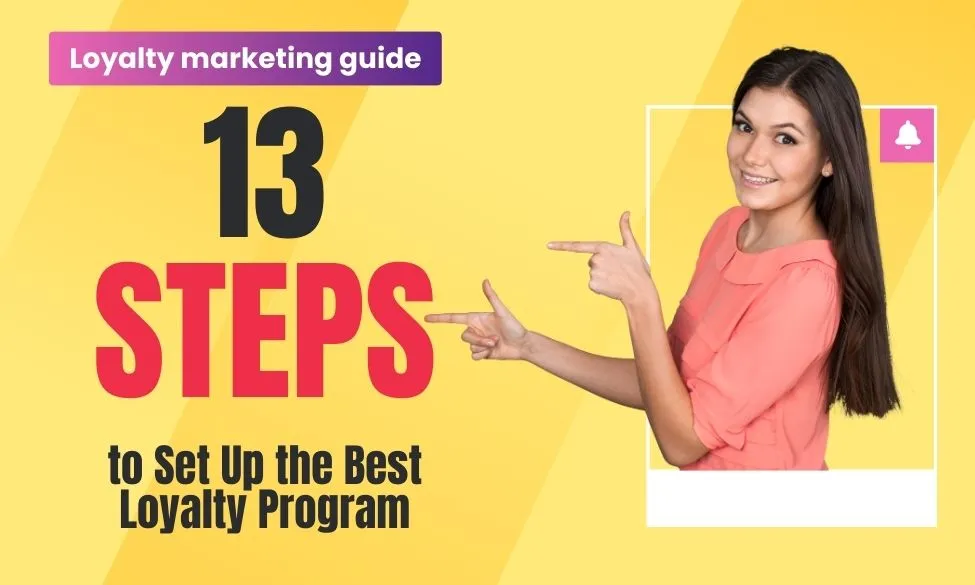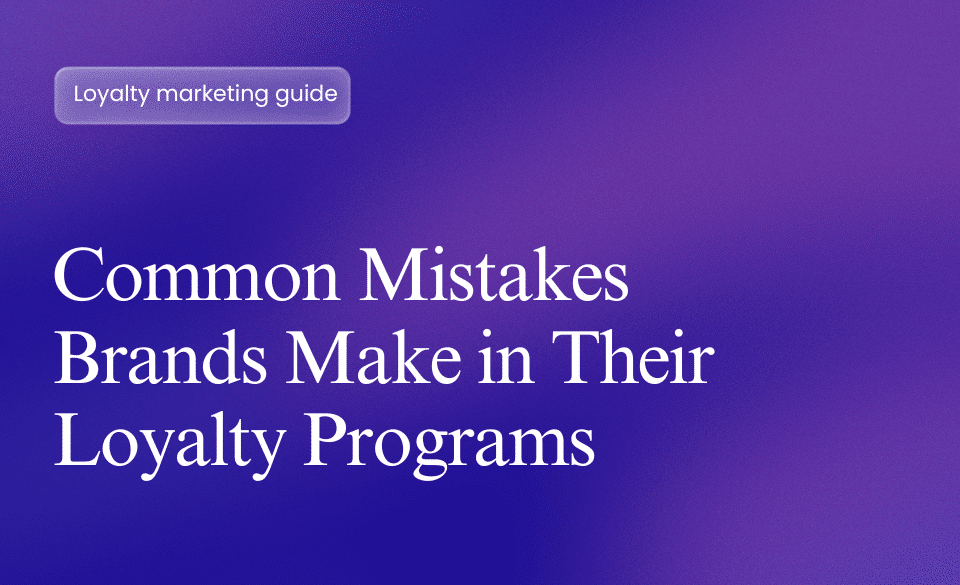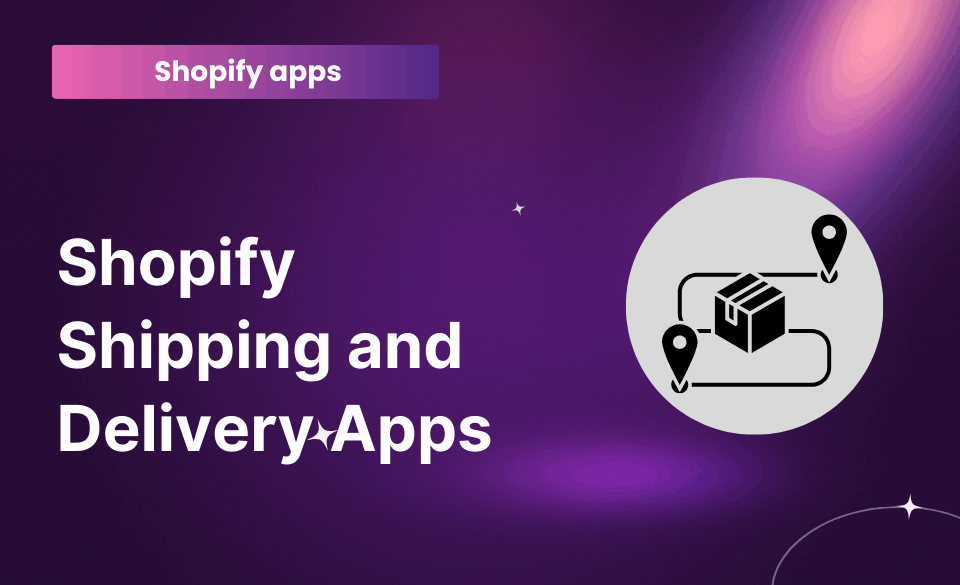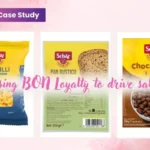
Case study: How a health products retailer using BON Loyalty to drive sales
16 April, 2024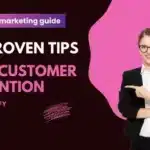
10 Proven Tips For Customer Retention & Loyalty On Shopify
8 May, 2024Want to choose the best loyalty programs for your ecommerce store? Like you, Shopify shop owners need brand loyalty and repeat business for success. However, choosing the best loyalty program may take time since many options exist.
Don’t worry; this post discusses loyalty program advantages, kinds (points-based, tiered, etc.), and ways to set up your e-commerce store’s loyalty program successfully.
Let’s start!
Why Loyalty Rewards Matter Ecommerce Success?
For your eCommerce shop, an eCommerce loyalty program may have a big impact. Here are some advantages to think about.
Increased Customer Retention
Did you know it costs 5-25 times more to attract a new client than to keep an existing one? That’s when loyalty programs come into play.
Think of it this way: loyalty programs are like planting loyalty seeds. 81% of customers are more inclined to remain loyal to a business with a great loyalty program. That means when you give them rewards, incentives, or exclusive access to keep consumers returning for more.
Data Insights Helps You Get Competitive Edge
It turns out 65% of your customers want you to get to know them better. That’s right – two-thirds of shoppers are happy to share their info in exchange for perks tailored just for them.
Imagine having real-time access to the precise products and searches that your consumers are making. For companies like yours, this information is like gold. It may be used for market research, product development, and personalized offers.
The numbers don’t lie: 68% of consumers in brand loyalty programs believe businesses understand their purchasing habits better. Speaking your customers’ language—offering rewards and recommendations tailored to their needs— makes them more likely to choose you over competitors.
Perceived Value
We’ve talked about how loyalty programs may help you collect useful data and tailor the purchasing experience.
But loyalty programs aren’t just transactional; they’re a way to connect with your customers on a deeper level. Rewarding their loyalty lets them know you appreciate and value them. This creates an emotional bond that makes them feel part of something bigger than buying products.
Emotional Connection
It’s very competitive in the world of online shopping, and customer trust is one of the main things that sets you apart. That’s why you should forge emotional connections with your customer’s success.
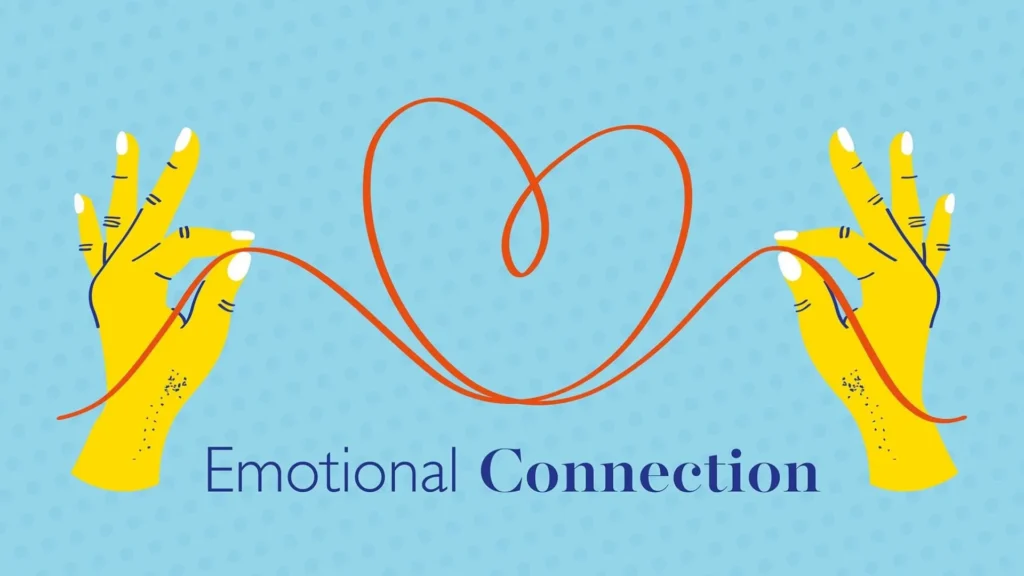
A customer’s lifetime value is 306% greater when they emotionally connect to a brand. Simply put, loyalty programs can turn one-time buyers into brand supporters by associating emotionally with customers. They’ll return and suggest your shop to friends and family, boosting your long-term e-commerce.
Thus, abandon the transactional technique and build connections by studying the 10 key characteristics of a successful program in the following section.
10 Essential Features Of An Effective Program
There’s no doubt incentive programs are an excellent method to retain customers, increase sales, and build a thriving online community. But the details are where the secret resides. The following ten elements are crucial for every successful loyalty program to have:
1. User-Friendly Interface: Signing up and understanding the program should be a breeze. Think of an intuitive interface and clear communication – happy customers are engaged customers.
2. Customizable Reward Options: Discounts (percentage or set amount), free goods, early access to discounts, exclusive items, or even tiered points with expiry dates may all keep people coming back for the next reward.
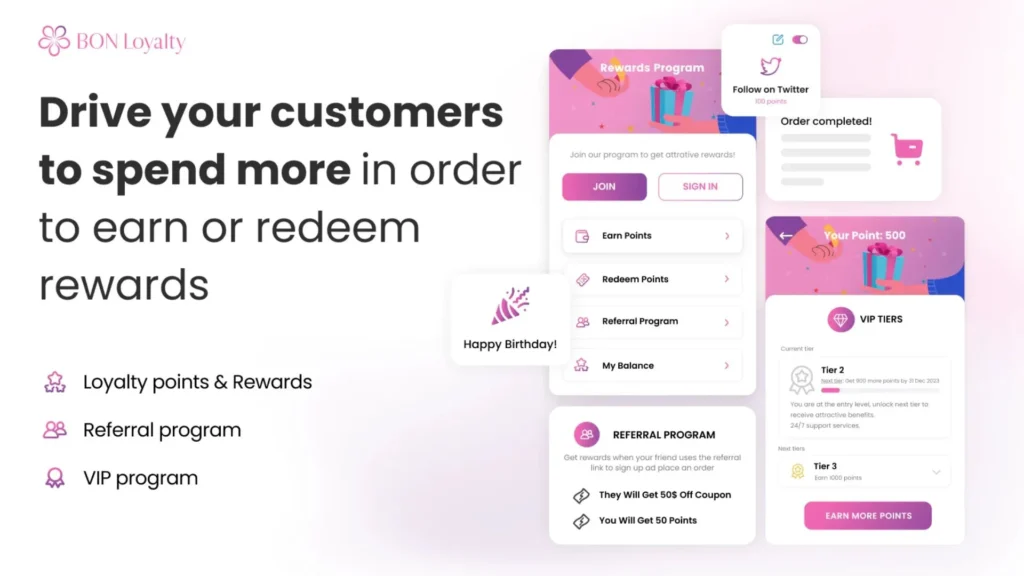
3. Seamless Integration: Choose a program that integrates seamlessly with your existing ecommerce platform. This ensures smooth operation and automatic data transfer, saving you time and frustration.
4. Data Tracking and Analytics: Improve customer insights with comprehensive data monitoring and analytics. Know what drives your consumers and what incentives work best, then tweak your program for optimum effect.
5. Scalability: Look for features to manage extra customers, orders, and complicated incentive schemes.
6. Built-in Marketing and Communication Tools: To reach and excite consumers, choose a package with email marketing integration, social media connection, and customizable promotional materials.
7. Tiered Rewards System: High-tier bonuses and awards inspire customers to go up the ranks and become more loyal.
8. Customer Support: Choose an app that is convenient for customers and helps them resolve concerns.
9. Security and Compliance: Choose software with strong security to secure data and follow requirements.
10. Branding Customization Options: Seek apps that change the program’s appearance and feel to match your brand.
However, it’s crucial that you choose the right types of rewards program for your brands; let’s find out in the next part.
5 Types of Loyalty Programs Suitable For Ecommerce
We’ll discuss five major ecommerce programs kinds in this section. Each program has unique benefits and serves different customers. You may pick the kind that best fits your brand identity, target audience, and company objectives by studying their capabilities.
Points-Based Programs
The Starbucks Rewards program is a recognized example of a successful tiered loyalty program. Starbucks fans earn “stars” with each buy, acting as the program’s currency. They customers may redeem these points for free drinks, and special items at various levels. This tiered system encourages client spending and involvement.
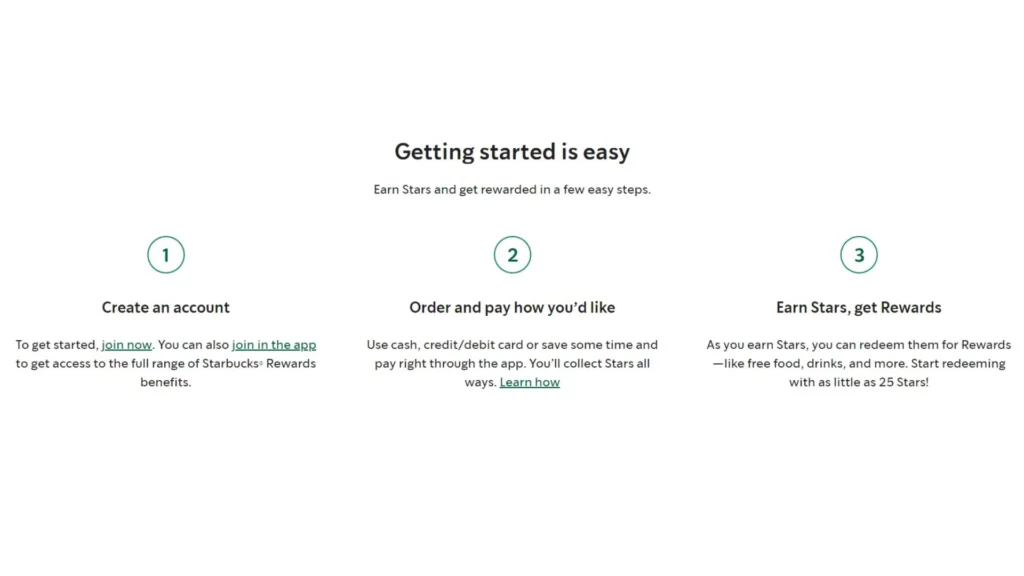
Here’s why a loyalty program with points might be the perfect match for your store, too:
- Simple to understand: It’s a piece of cake for you and your customers to grasp. Who doesn’t love collecting points? Seeing their progress towards a reward motivates them to return for more.
- Flexibility for your brands: You choose how many points each buy generates and what fantastic prizes they may be redeemed for. This enables you to customize the program to your spending plan and promote certain client habits. For instance, you may provide points for products that are more expensive.
- Valuable customer data: Track how your customers earn and spend points to learn more about what they like. This information is helpful; use it to make deals more relevant in the future and keep them interested.
Thus, if you’re looking for a program that’s simple to use and maintain and encourages repeat business, a points-based system may be the best fit.
Tiered Loyalty Programs
Tiered loyalty programs let you provide your top members with VIP service and rewards. These programs classify clients by expenditure or involvement. The bigger the spender, the sweeter the deal.
Ulta Beauty is a good example. The more shoppers shop at Ulta, the higher their tier climbs and the better the view (rewards):
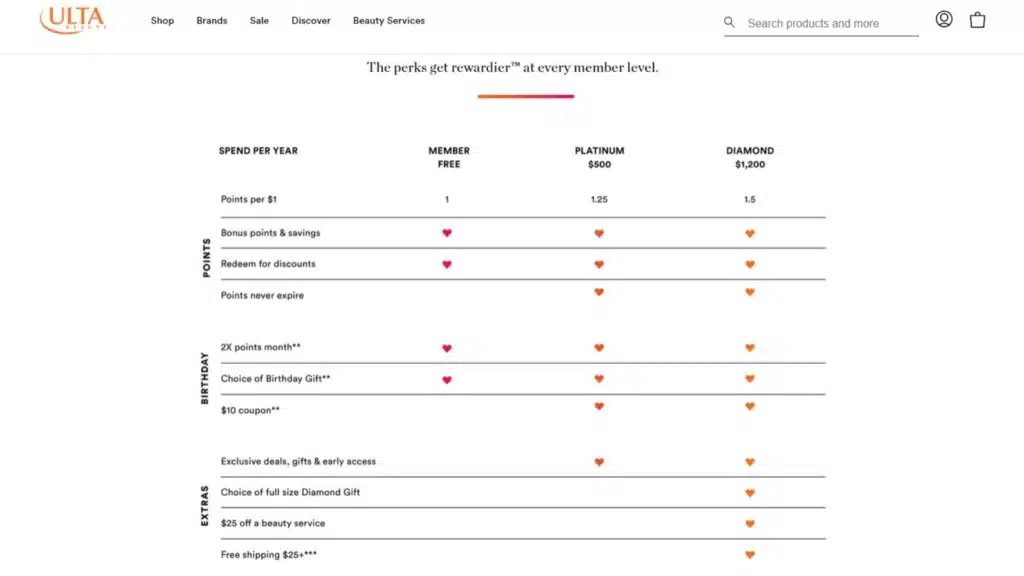
- Beauty beginner (Free): Join the Ultimate Fam and earn points on every buy. They’ll receive a special birthday gift.
- Silver level ($450 or more in yearly spending): Member get extra point incentives and have first access to popular new goods. That’s what we call VIP access.
- Diamond diva ($1200+ annual spend): Say goodbye to shipping fees. Plus, Ulta lovers will earn points at the fastest rate, have a dedicated customer service line for all their beauty questions, and score invites to exclusive events. They’ll be treated like Ulta royalty.
Here are some reasons your shop may enjoy a tiered program, too:
- Supercharge customer engagement: Everyone loves a good challenge. 66% of customers think incentives impact their purchasing. By providing your consumers with a goal to work for, tier programs encourage repeat business and help them move up the loyalty ladder.
- Reward your biggest fans: You can show your VIPs how much they are appreciated by offering them special prizes via tiered programs. Both of you will enjoy it—they will get the royal treatment, and you will gain even more devoted clients.
So, a tiered loyalty program might be your key to increasing customer return rate.
Referral Programs
To understand referral programs, look at M.A.C Cosmetics’ “M.A.C Lovers” program, which is a shining example of a successful referral program. Here’s how it works: M.A.C fans can share a unique link with friends. Then, members get a discount on their first buy when their friend clicks the link and signs up.
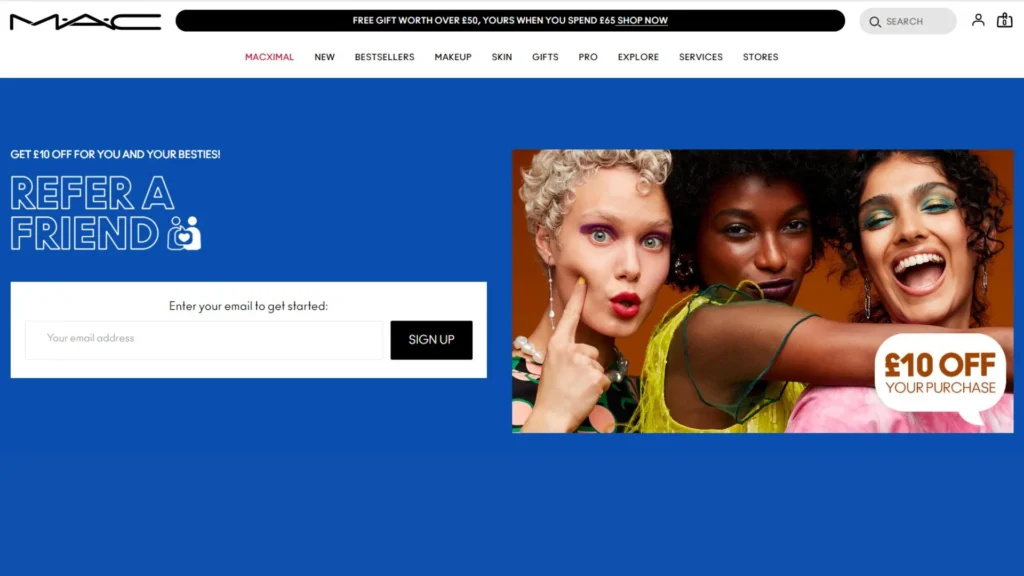
So, how can a referral program benefit your Shopify store?
- Word-of-mouth marketing: Studies say that customers with a strong brand affinity are 71% more likely to become brand advocates. That is free advertising.
- Loyalty boost: Rewarding them for sharing their love for your store strengthens their loyalty and keeps them returning for more. It’s a fantastic way to say “thanks” for being awesome.
- Thriving community builder: Referral programs can help people feel like they are part of a group around your brand. Customers who take part will feel like they’re a part of something special, which can help them stay loyal over time.
Overall, referral programs foster community and brand loyalty among existing customers.
VIP Membership Structure
Imagine your most loyal customers feeling like rockstars, not another number on a spreadsheet. That’s the power of tiered loyalty programs with VIP elements.
Let’s talk about the top tier of Marriott Bonvoy, as an example, Ambassador Elite. Forget rigid check-in times – choose the perfect 24-hour window for a stay, ideal for late-night arrivals or early departures.
Plus, every dollar Marriott Bonvoy member spends at the hotel – from their room to those indulgent spa treatments – earns them a whopping 75% bonus on points. It’s like having a personal travel rewards ATM.
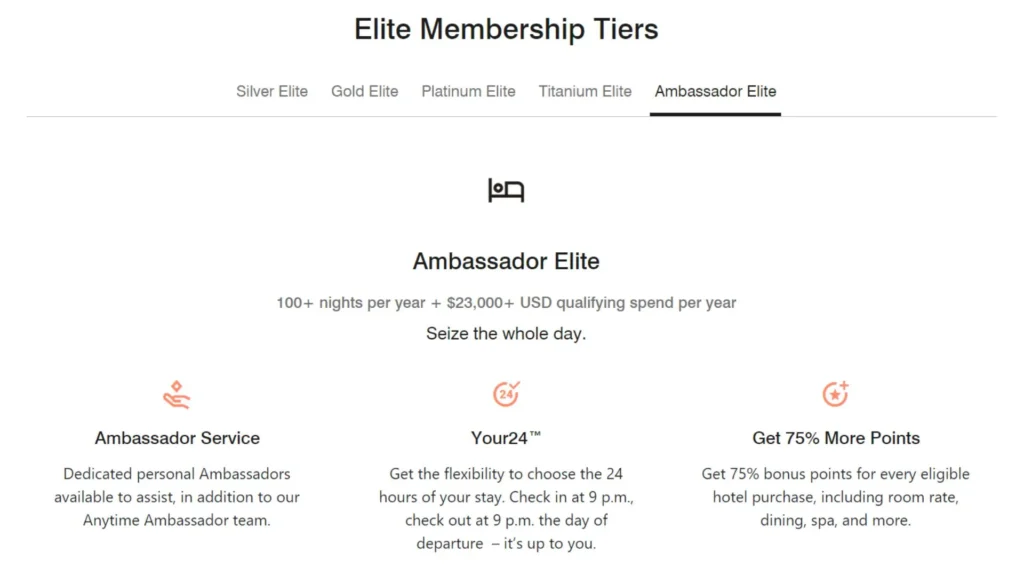
Marriott Bonvoy’s program is one example. By creating tiers with VIP benefits, businesses can cultivate a community of loyal brand advocates who feel appreciated and pampered. This, in turn, fuels long-term success and keeps customers coming back for more adventures.
Punch Cards Or Stamps
Remember the excitement of collecting colorful stamps in a card with every buy? Believe it or not, these nostalgic tactics are still effective rewards program tools for your e-commerce store.
Take Mad Mex, for example. They have integrated their mobile app with a digital stamp card. Mad members get a virtual stamp for every delectable meal bought. If members get ten stamps, they can eat for free. By tracking progress, the app keeps users interested and inspired.
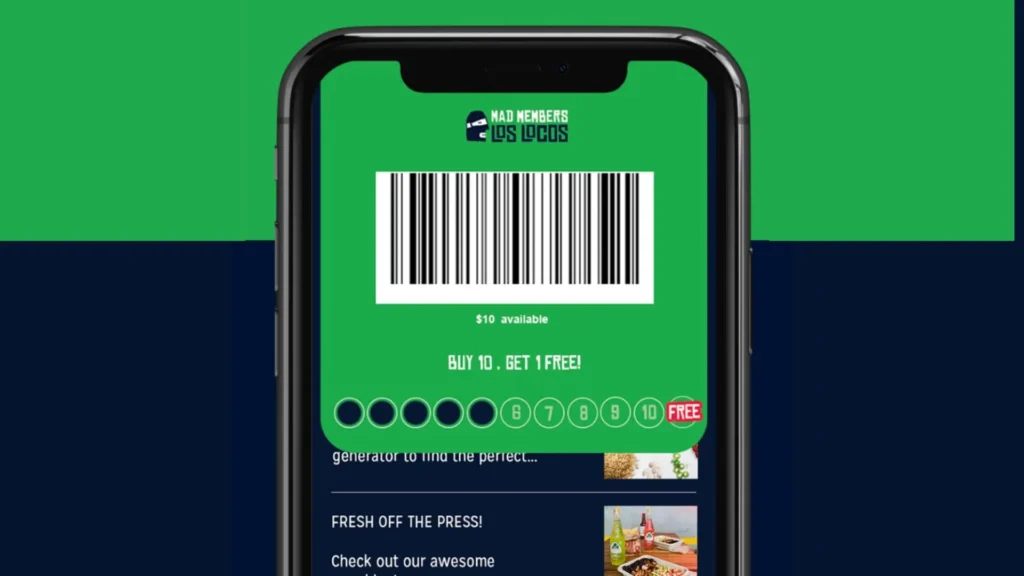
These traditional loyalty program choices can be ideal if you’re looking for an easy, nostalgic, and user-friendly strategy to cultivate client loyalty. See the next section to learn about the best incentives for an e-commerce loyalty program.
What Are The Most Effective Rewards For An E-commerce Loyalty Programs?
We learned about 5 types of loyalty programs that work well for online shopping. But, with so many possibilities, picking loyalty program incentives may be challenging.
Don’t worry—here are the most effective loyalty program rewards:
- Points-Based Loyalty Programs: Members earn points for purchases, which they can redeem for discounts, free products, or exclusive experiences.
- Discount-Oriented Loyalty Programs: It’s no secret that customers’ top motivations for signing up for loyalty programs are access to sales, discounts, or free merchandise.
- VIP Tiered program: Members climb the ladder based on engagement, unlocking lucrative rewards like increased points or free shipping. It makes your best customers feel particular.
- Referral Loyalty Programs: Turn happy customers into brand ambassadors with a referral program. Customers will be rewarded for recommending your store.
- Gamified Loyalty Programs: Level up engagement with gamification. Integrate points, badges, and leaderboards for a fun and exciting shopping experience.
By combining these rewards, you can create a loyalty program that works for everyone and keeps them motivated. Select what works for your company and reward regular customers who love your store. After choosing the right loyalty program, let’s apply it in e-commerce with the instructions in the next part.
Steps For Successful Implementation Of An E-commerce Loyalty Program
In this section, we’ll walk you through each of the key phases to help you establish a terrific loyalty program that your customers will like. From setting goals to engaging with your company, we’ll cover all you need to know to establish your program.
Step 1: Define Your Objectives
The success of your loyalty program is dependent on well stated objectives. These objectives will define the program’s features and structure, as well as the amount of funds you provide.
Usually, loyalty programs have 2 main goals:
1. Attract new customers (focus on referral programs)
Budget: Expect to spend more on acquisitions. To attract new clients and encourage their initial buy, give better benefits.
2. Maintaining current consumers and increasing their lifetime value (LTV).
Budget: This is where you may break down a more acceptable budget. Customers may return for more since prizes promote repeat purchases and program engagement.
Once you know what your main goal is, you need to make it into a SMART goal, which stands for Specific, Measurable, Achievable, Relevant, and Time-bound. This will help you make an exact plan for figuring out how well your program works and making sure it fits with your business plan.
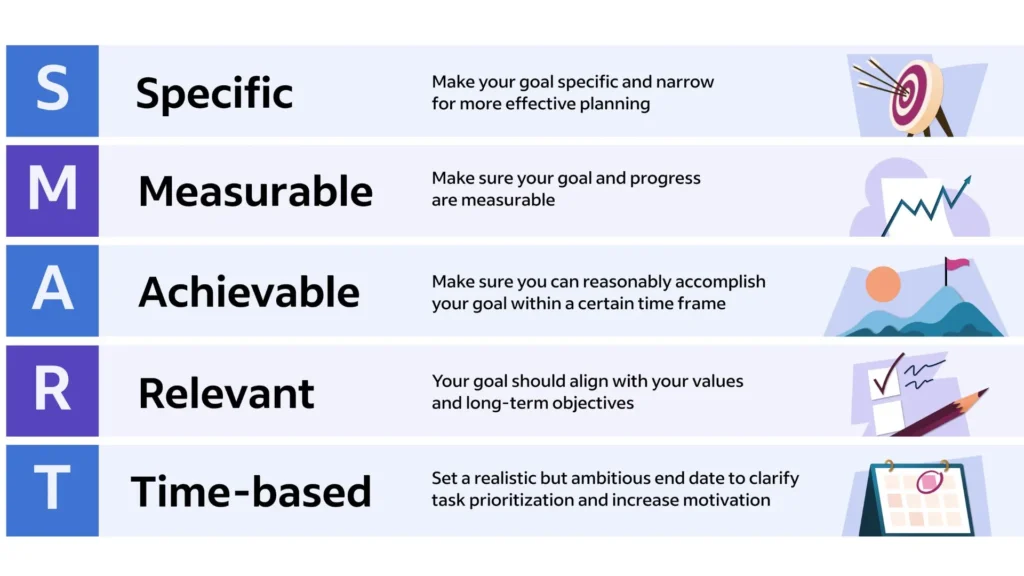
Step 2: Understand Your Customers
For your reward program to work, you need to know your customers well. Here are three important ways to get useful information and make your program fit your needs:
1. Leverage Customer Data Analytics:
- Purchase Behavior Analysis: Look into sales data to learn how people buy things. Think about how often they buy, how much they usually spend, and what they buy. These results could help you come up with awards for customer buy more or try new things.
- Engagement Analysis: Examine how clients use your loyalty program. Track information such as points earned, redemption rates, and program activity levels. You may promote program features or change incentive levels to maximize involvement.
2. Conduct Targeted Customer Surveys:
- Create loyalty program surveys: Direct feedback helps improve how customers see things and shows where improvements can be made.
- Open-Ended Questions: Combine open-ended questions with multiple-choice alternatives. Customers may offer opinions and comments, uncovering unknown preferences or program trouble spots.
3. Analyze Customer Reviews:
- Sentiment analysis: Consider both positive and negative feedback from customers on a frequent basis. Look for themes that appear often in reviews to determine ways to improve the program and keep clients satisfied.
- Actionable Insights: Use review insights to resolve consumer complaints and highlight program strengths. This shows feedback responsiveness and confirms the program’s worth.
The key to creating a program that feels like a one-of-a-kind celebration for each client is getting to know them. Everyone would want to be a part of that type of celebration.
Step 3: Choose The Right Type Of Program
In the preceding section, we covered many choices, including point-based systems, referral programs, and tiered programs. Your company and consumers may benefit from the loyalty program model you pick based on your objectives and audience.
| Program Type | Description | Benefits | Drawbacks | Ideal For |
| Points-Based Programs | Customers can get points by reviewing products, making purchases, or interacting on social media. You can exchange your points for deals, free stuff, or one-of-a-kind events. | Simple & easy to understand. Flexible reward structure.Valuable customer data. | Low Perceived Value: Points may feel impersonal or intangible compared to immediate discounts. Inflationary Potential: As consumers’ point balances increase, programs may need to be adjusted to preserve reward value. | Businesses of all sizes. Encouraging repeat purchases. |
| Referral Programs | Customers receive rewards for referring new customers to the business. | Cost-effective customer acquisition.Increased brand advocacy.Community building. | Limited control over new clients: Recommended clients may not have the same purchasing patterns or brand loyalty as current clients. Potential for abuse: Referral programs can be vulnerable to fraudulent activity like fake referrals. | Businesses with existing customer base. Ideal for businesses seeking to build a strong community of brand ambassadors. |
| Tiered Loyalty Programs | Customers progress through tiers based on spending or engagement, unlocking increasingly valuable rewards at higher levels. | High engagement.Rewarding top spenders.Personalized experience. | Complexity: Tiered programs might be more difficult to design and manage than simpler incentive programs. Potential for Discontent: Lower tiers may feel like they receive less value, requiring careful design to maintain overall satisfaction. | Suitable for businesses with a loyal customer base looking to segment and reward high-value patrons.Driving increased Customer Lifetime Value (CLTV). |
In the next step, we’ll examine a few loyalty program platforms to help you choose the best one for your store.
Step 4: Select A Loyalty Program Solution Provider
Upon selecting a program type, the next step is to choose software to turn your loyalty program into an actuality. To keep the benefits coming in, it needs to be simple to use and work well with your store.
Many loyalty program platforms are available, but we recommend considering BON Loyalty for Shopify stores like yours as it is the top-recommended Shopify loyalty app voted by Shopify merchants.
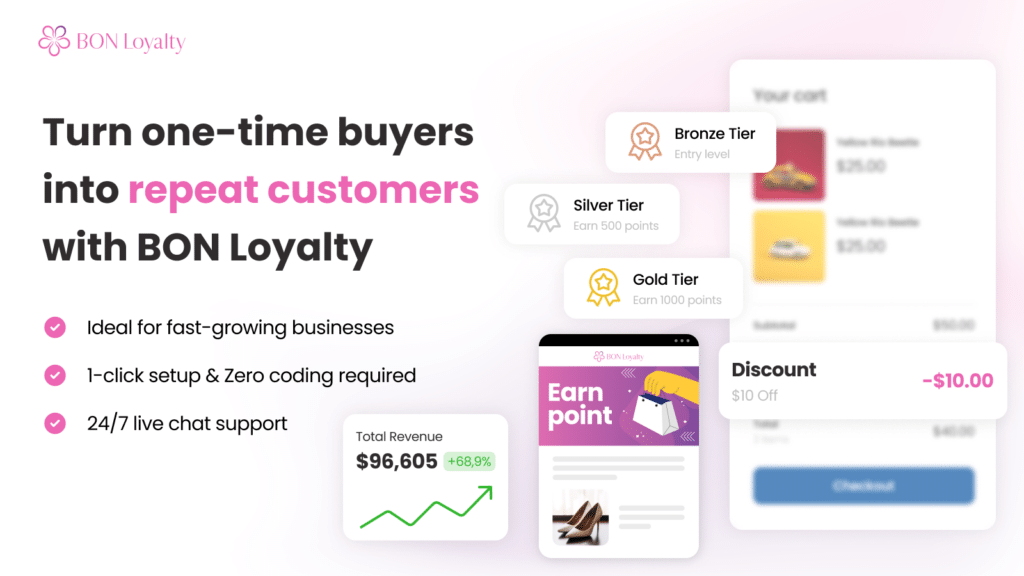
Here’s why:
- Feature-Packed: From unlimited rewards and powerful referral programs to VIP tiers, the BON app lets you create a program that excites your customers.
- Customization brands: You can change the look of everything to match your brand, including the reward badge, home page, emails, content, and more. Your program will complement your shop.
- Globally speaking: Showcase your loyalty program in over 250 languages – perfect for reaching a wider audience.
- Migration made easy: Switching from another loyalty app? No sweat. The BON app has 24/7 support, ensuring a smooth transition.
- Built for Shopify: Enjoy a seamless integration with Shopify that guarantees fast page speeds for your store.
In the following stage, we’ll look at how to set up your program to optimize its effect. But, for the time being, consider the BON app as a possible partner in ensuring the success of a loyalty program.
Step 5: Design The Program Structure
Now that you’ve got your goals, your customers on your radar, and the right software on board (like BON Loyalty). It’s time for the fun part: designing the structure of your loyalty program
- Find the earnings ratio: Determine how many points clients gain for every dollar spent. This is your cashback percentage (for example, $1 spent equals 5 points for 5% cashback).
- Establish redemption rules: Determine how many points consumers will need to redeem for prizes. To keep your program clear and fair, ensure that the points necessary match your cashback %.
- Choose earning actions: Select at least 3-5 ways customers can earn points beyond purchases. This can include signing up for an account, celebrating birthdays, or engaging on social media.
- Pick your rewards: Decide what rewards you’ll offer (e.g., percentage discounts, fixed dollar amounts off, free products).
Please read the full blog here for a more in-depth look at each step, complete with useful examples and additional things to think about.
Here is a list of all of The North Face Xplorers Club’s reward programs to give you ideas. Explorers spend 1€ to get 1 point, which they then use to do things online (like passing a course, doing a review, etc.). Some of the rewards are savings, invites to special gear events, and free access to gear.
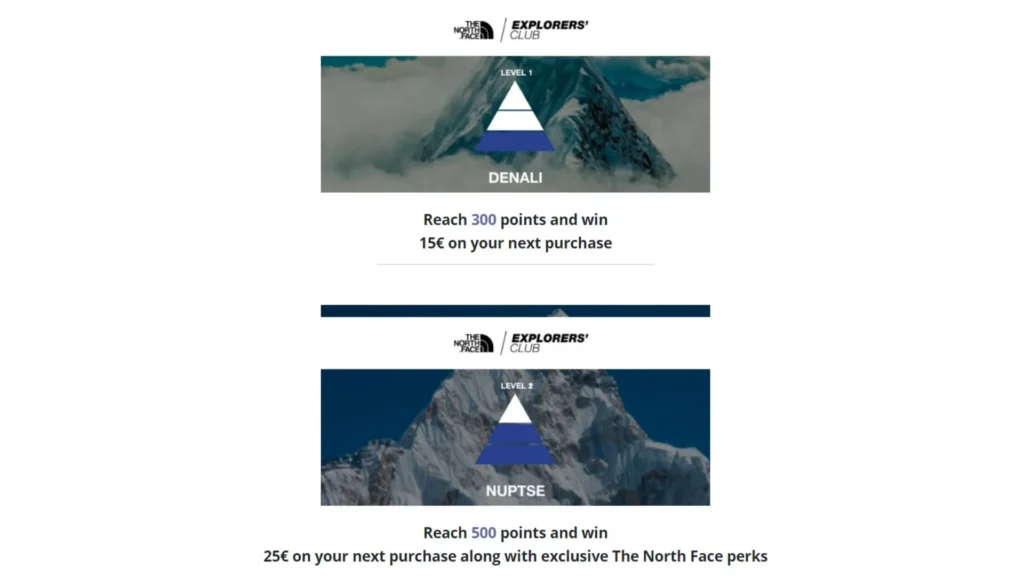
Always remember how important it is to create a program that excites people and helps your company reach its goals. In the next stage, we’ll discuss how to personalize your program’s appearance and feel so that it really pops.
Step 6: Customize The Program
Now that you’ve designed the reward structure for your loyalty program, it’s time to make it stunning. Imagine your store’s colors, fonts, and overall vibe – you want your loyalty program to feel like a natural extension of your brand.
Here’s how you can customize your program to make it shine:
1. Cohesive User Interface (UI):
- Brand Consistency: The program home page, email correspondence, and website reward widget should have the same visual identity. This streamlines user experience and boosts brand familiarity with the loyalty program.
- Personalized Environment: Create program pieces that complement your online business. Customers will feel at home in the app with familiar color schemes, brand logos, and design styles.
2. Reward Customization: Examples include customizing award appearance (e.g., digital badges, discount vouchers) or selecting reward alternatives that appeal to your target audience.
3. Personalized Communication:
- Targeted Communication: Personalize loyalty program emails and texts with client names.
- Brand Voice Communication: Your loyalty program correspondence should mirror your brand’s voice and tone. It might be welcoming and conversational, educational and professional, or anything in between, based on your brand personality.
Take Nike’s app program as an example. The UI matches their athletic, performance-focused brand. Exclusive material like training advice and early product debuts makes members feel special and excited.
They also tailor product suggestions and challenges to members’ hobbies (running, basketball, etc.). It’s like having your own Nike coach to help you reach your fitness goals.
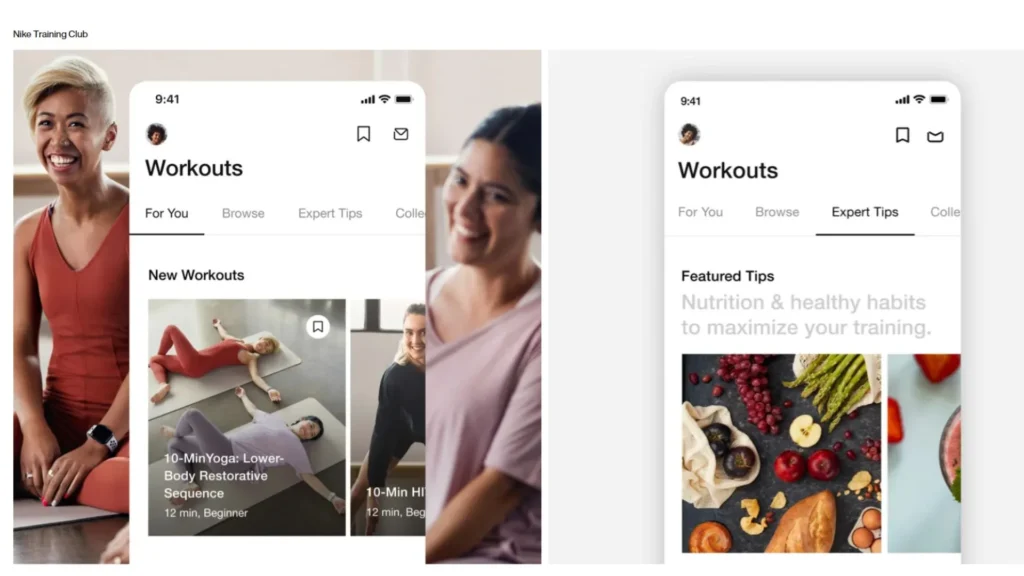
By making changes to your program, you can give your customers a more interesting and unique experience. We’ll talk about how to add this amazing loyalty program to your Shopify store in the next step.
Step 7: Integrate The Program With Your Ecommerce Site & POS Store
Now that your loyalty program looks fabulous (thanks to customization), it’s time to breathe life into it by connecting it to your e-commerce site and your physical POS system (Point-of-Sale). This creates a unified experience for your customers, regardless of where they shop with you.
Here’s what you can expect:
- Seamless Participation: Ensure customers can earn and redeem rewards seamlessly on both online and offline channels. This reinforces the program’s value and encourages continued engagement, regardless of their shopping preference.
- Effortless enrollment: Make program enrollment a breeze, allowing customers to join at checkout on your website, through a simple in-store form, or even through your POS system.
- Real-Time Tracking: Integrate your POS system to enable real-time point tracking and redemption. This provides instant gratification to customers, and fosters trust in the program’s accuracy.
Here’s the good news: Shopify is known for its user-friendly integrations. If you’re using a loyalty program app like BON Loyalty, they’ll likely have a simple setup process that involves a few clicks. No coding knowledge is required.
Using The North Face Explorers Club again as an example, members may easily sign up for the loyalty program by clicking the “Sign Up” button on the webpage. The customer’s current membership tier and point balance are then shown on the profile page.

Like The North Face, you should make sure the connection goes smoothly to keep customers interested in your program. In the next step, we’ll talk about how to teach your staff to be great at the reward program.
Step 8: Train Your Team
Based on our experience working with over 6,000 merchants to develop reward programs on Shopify, we recommend that you provide your staff with three key points:
1. Understand the rewards system:
Ensure the staff understands your loyalty program’s earned points and redemption requirements.
- With earn points: Explain all acts that earn points, the point value for each activity, and any point expiry dates.
- With redemption rule: Clearly communicate to your staff the potential redemption choices, including a variety of discounts, free shipping incentives, and free product redemptions.
2. Multi-Platform Skill:
Train your staff members to use the loyalty program administration app across all key devices:
- iPads: Equip your team to handle program tasks and customer inquiries on the go.
- PCs: Give them the program’s backend for complete administration.
- POS Devices: Maintain point allocation and redemption efficiency by integrating with your POS system.
3. Data-Driven Insights:
Train your staff on fundamental data reading and analysis skills relevant to the loyalty program. This allows them to:
- Analyze program data: Help them analyze consumer behavior and program use statistics.
- Gain customer insights: Using program data, empower them to spot patterns and consumer preferences.
Developing your staff’s expertise enables them to emerge as genuine advocates for your loyalty program. More informed and effective program implementation leads to client happiness and program success.
Step 9: Launch The Program & Marketing
It’s time to open the doors to the celebration now that your loyalty program is ready and polished and your staff is ready to applaud.
Let’s use a focused marketing effort to generate excitement for the debut of your program:
- Email marketing.
- Social media.
- Website banner.
To get people excited about your program and sign up, you need a launch campaign that is both entertaining and instructive. To learn how to do it, keep reading. We will investigate ways to reward such signups with extra perks in the next stage.
Step 10: Encourage Sign-Ups
Now that the world has heard about your wonderful loyalty program debut. Now is the moment to make the offer more alluring in order to get them to participate in the celebration. Think of it as party favors to get everyone engaged.
Here are some ways to incentivize sign-ups:
- Bonus point: Offer a bonus point welcome gift for customers who sign up during your launch period.
- Welcome discount delight: Offer new program participants a special discount on their first buy as a welcome gift. Consider it a unique “new member discount” that they may use to buy reduced goods as a party treat immediately.
- Double points dash: During the week of the program debut, run a short-term offer where clients get double points for every buy. This is a fantastic method for getting them interested in the rewards program and earning points.
The Body Shop adopts a novel strategy by rewarding sustainable behavior with discounts. Their members can register online and get 15% off their first purchase.
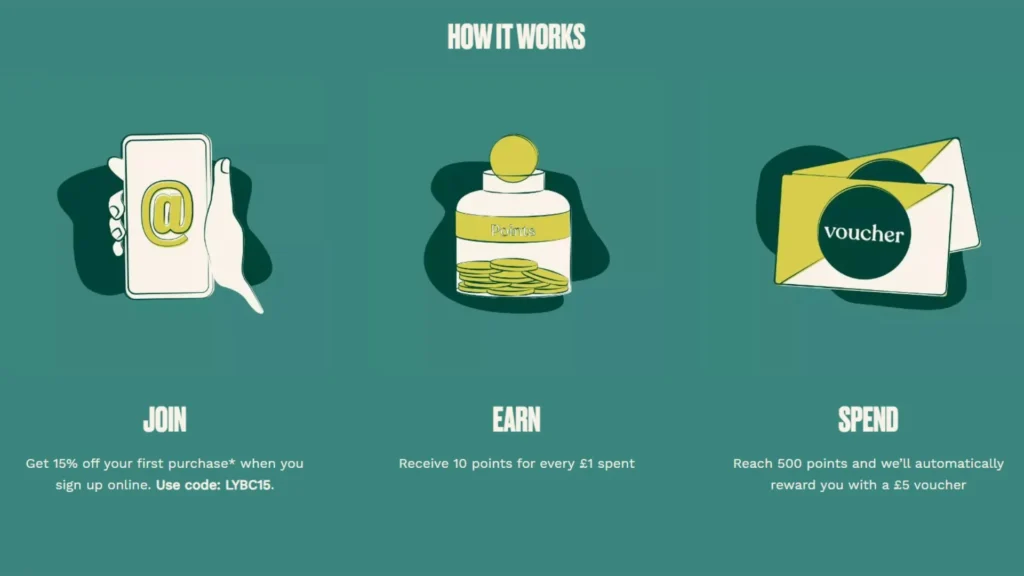
Offering these signup bonuses will generate urgency and excitement, driving people to join your program and start earning.
Step 11: Collect And Analyze Data
Your loyalty program is up and running, but how do you know it’s a hit with your customers? This is where data analysis comes in.
You can determine what aspects of your program are successful and which may need modification by routinely gathering data about it. This is the type of information you may get:
- Program popularity: See how many customers are signing up for your program. Is the party invitation reaching the right people?
- Engagement incentives: Monitor how clients are receiving and using rewards. Do they seem enthusiastic about the goodies you’re providing?
- Buying behavior: See if your program is influencing buying habits. Are your loyal guests coming back for more purchases?
Like a party guest feedback form, data analysis lets you identify what’s working and what should be changed.
Step 12: Seek Feedback And Improve
Although we’ve hosted an amazing loyalty program, we still want to make sure that our customers—are having a great time. This is when asking for feedback becomes important.
If you ask for and look at customer feedback, you can make your program better all the time and give your loyal customers even more benefits.
Remember that a reward program works both ways. It’s meant to show your customers that you value their business and keep them interested over time.
Step 13: Market The Program Continuously
Customers love your loyalty program but don’t allow it to become a secret treasure. Consider it like a lavish party; to guarantee a constant flow of enthusiastic attendees, you should remind people about it.
Here’s how to promote your program and draw in new participants:
- Email Marketing Magic:
Regularly include promotions and program updates in your email marketing efforts. Emphasize the latest incentives, member perks, and success stories (clients are enthralled with the program).
- Social Media Spotlight:
Give away things or hold events that are only open to people who are involved in your reward program.
Also, share reviews from customers who have used the tool and liked it. You can think of it as sharing fun things on social media and asking new people to join the party.
- Website Welcome:
Put your program right in the middle of your page. Use ads, pop-ups, or landing pages to tell people about the perks of the program and get them to sign up.
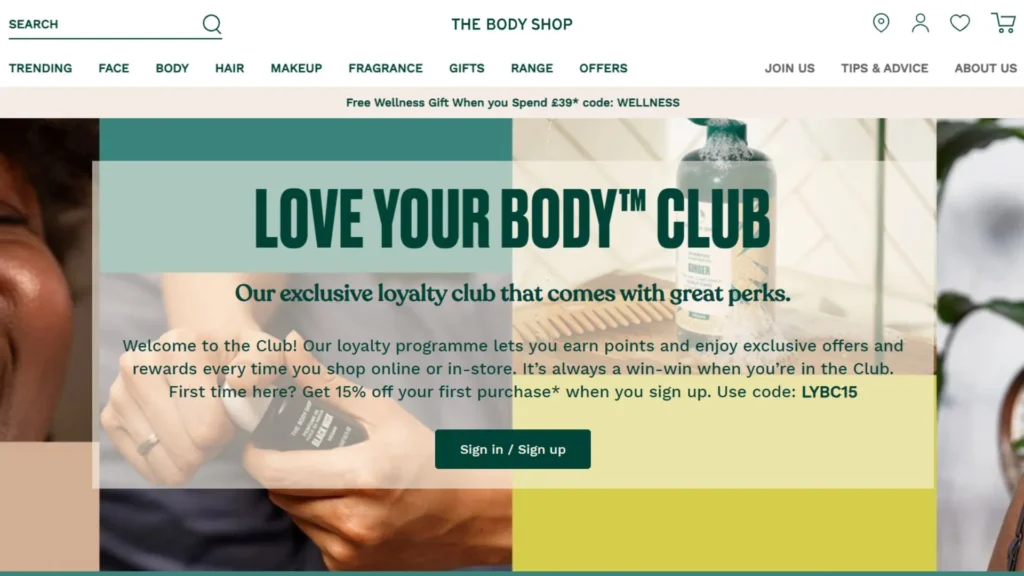
By advertising your program often, you can keep it top of mind with current members and draw in new ones who want to join the action. Building a community of involved and compensated consumers is the essence of a successful loyalty program.
This brings an end to our 13-step guide on creating a fantastic loyalty program for your business.
Measuring The Success Of Your Loyalty Program
To find out how well your reward program is doing, you need to collect important data like you would with any other business. It was as if your guests were telling you what they liked, what they thought could be better, and if they’d come back for another party.
Key Metrics And Performance Indicators Of Your Loyalty Program
Here are some key metrics to track and see if your program is achieving its goals:
The member list (Enrollment numbers): You can see how many clients joined the program. A high figure indicates a large party attendance—a good start!
Active participation rate: Imagine this as the “dancing shoes on” rate. It shows how many individuals earn and redeem incentives.
Reward Redemption Rate: This is like counting party goodies taken home! High redemption rates say consumers value incentives.
Repeat Buy Rate: Like old friends returning for more celebrations! It indicates repeat business from loyal clients.
Average Order Value (AOV): Consider this the “average amount spent per guest.” Do loyalty program members spend more than non-members? They may be tempted to spend during the celebration!
Customer Lifetime Value (CLV): Basically, the “total value of a customer over time.” The CLV of loyal program members should be greater, suggesting they bring more business to your shop over time.
Program Cost vs. Return on Investment (ROI): Compare program expenditures (rewards, marketing) to loyal customer revenue growth.
Churn Rate: This is like counting early party leavers. A high turnover rate may indicate program issues.
Referral Rates: Consider this the “bringing their friends to the party” pricing! See how many new customers join because current members spread the word. If your referral rate is high, your program is developing brand evangelists.
You may determine opportunities for program improvement and assess what aspects of your program are successful by monitoring these indicators.
Common Pitfalls To Avoid:
You’ve worked hard to develop a loyalty program, but hang on. Let’s make sure it’s not just another old party that everyone has seen before you hit launch. We don’t want to be that retailer that sells the same old worn-out prizes as everyone else, since it will make customers drowsy.
Here is a typical mistake to stay away from:
Offering Generic Rewards That Don’t Stand Out From Competitors
Think about a party where all the stores brought the same bag of chips. Booooring! Be unique; don’t provide the same basic rewards that every other shop does. Think outside the box and create a program with unique features that make your customers say, “Wow, this is cool!”
First, unique experiences. Reward your customers with early sales, behind-the-scenes tours, or design team discussions. Like Chick-fil-A One, it offers Signature Surprises, only for Chick-fil-A One® Signature Members – the top 1 their tiers.
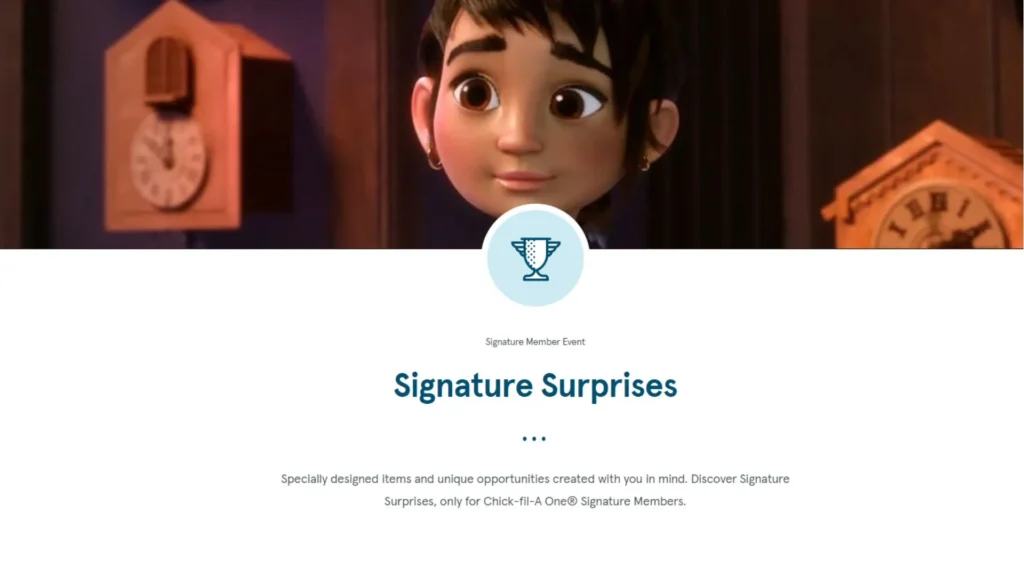
Also, personalized offers. Imagine loyalty program members receiving birthday discounts on their favorite goods or extra points for browsing previous purchases. It’s like a celebration where everyone gets a favorite present.
Finally, partnerships for the win. Join other companies to provide distinctive rewards. It’s similar to having a well-known band perform at your party—it generates excitement and provides something unique that your rivals can’t replicate.
Your Loyalty Widget Or Loyalty Page Doesn’t Match Your Brand Aesthetic
Imagine having a pool party with only snowflakes and animals as decorations. It’s confusing, right? The same goes for your reward program; it should fit in with how your business feels in general.
A customer loyalty program is like a mini-brand. With a consistent experience, you can fortify your the brand’s identity and leaves a long-lasting impact.
Here’s the fix: Personalize your loyalty program to reflect your brand. Keep the logo, color scheme, and fonts consistent with your website. Make sure to include your brand pictures; the goal is to provide your consumers with a smooth experience.
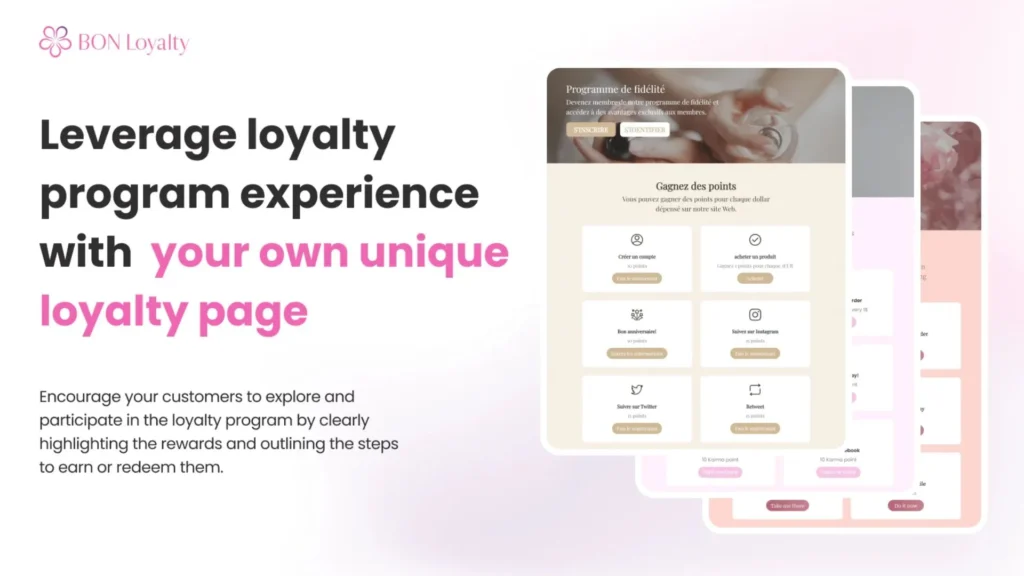
Inadequate Promotion And Communication
A well-designed loyalty program is only effective if customers know its existence and its benefits. Here are key strategies to promote your program and drive member enrollment:
1. Targeted Email Marketing:
- Program Launch Announcement: Create an exciting program launch email. Emphasize consumer advantages and value. Customers are invited to join via this email, which includes a clear CTA.
- Targeted Communication: Segment your email list and customize program messaging for various client groups. This tailored strategy boosts engagement.
2. Social Media Buzz:
- Engaging Content: Use social media to promote your program. Inform and delight with postings on the program’s prizes, privileges, and simplicity of joining.
- Interactive elements: Use program-related polls, quizzes, and competitions to engage your social media audience.
3. In-Store Activation:
- Visual Appeal: Advertise your program in-store using posters, fliers, or placed signs.
- Staff Training: Give your personnel program expertise. Train them to present the program, answer questions, and resolve concerns.
4. Multi-Channel Communication: Email, social media, and in-store promotions should be consistent. Brand awareness and program identity are strengthened.
If you use these tips, you can make a complete marketing plan that hits your target group, gets people interested in your reward program, and gets new members to sign up.
Summing up
Today, you know more about the exciting world of loyalty programs and can create one that keeps your customers returning for more. Remember that the goal of any program is to make things better for everyone. When you thank your devoted clients for their business, they become your greatest brand promoters.
Among the many loyalty apps available, the BON Loyalty app is an excellent pick for Shopify business owners. Don’t forget to update our blog with the newest information about loyalty programs so you may learn more about them.
Lindsey Nguyen is a Content Marketing Specialist at BON Loyalty, specializing in digital marketing and eCommerce. At BON Loyalty, she crafts content that empowers Shopify store owners to build and sustain thriving customer relationships through innovative loyalty programs. Her articles, often featured on the BON Loyalty blog, provide valuable strategies and insights that help businesses enhance customer loyalty and increase customer lifetime value.
